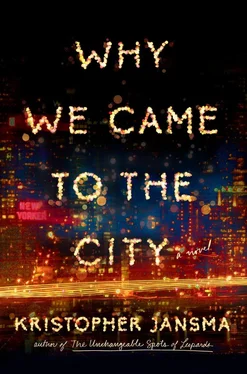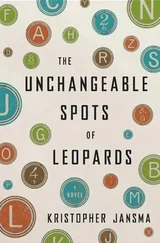On her lunch break Sara went up to check out the Morningside Heights apartment. Since they’d arrived six years ago, the rents had climbed far faster than their pitiful raises. She found herself feeling grateful the housing market had just spectacularly collapsed (though she knew this was awful) because the rents weren’t increasing for the first time in six years. But they weren’t going down either. Occasionally she and George did find places that seemed within reach, but the listing would disappear before they finished their application. No matter, they had always already begun to get cold feet.
Because George couldn’t realistically come in from the observatory on his lunch break, Irene joined Sara to see apartments sometimes during the week. Most of the time she was either just coming from or going to an appointment at Mount Sinai, but she never said more than “It was fine” or “They don’t know if it’s working yet,” when Sara asked how it was going. Nothing would be determined until April, when this latest round of chemotherapy would be finished and new scans would be taken. That day they met by the steps of St. John the Divine and hugged, and Sara thought she noticed Irene wince a little from her light touch through her red pea coat. She looked pale, for sure, but then so did everyone; the sun hadn’t been out in weeks.
“Have you spoken to Jacob yet?” Sara asked, as they walked past the sculpture garden and down to the corner of 110th and Amsterdam.
“I saw him yesterday. He yakked my ears off about his stupid boss for an hour. They have this rule, apparently, where they don’t talk at work, except Jacob has to always wave hello to Oliver when he walks by his office, because everyone else does and so it might look suspicious if Jacob didn’t. But Jacob says that he’d rather just never say hello to anybody ever, including Oliver—”
This wasn’t what Sara had meant, but then a tour bus roared by, its double-decker top filled with elderly Europeans wearing complementary ponchos just in case the solid gray sheet of a sky made up its mind to rain. The tourists snapped photos of the cathedral as the bus idled at a red light, and then the light went green and they roared along toward Columbia University and the Apollo Theater beyond.
“Here’s the building!” Irene shouted. A hand-drawn sign taped to the door announced the open house, and the door itself was propped open with some wadded-up coupon circulars. Sara wrinkled her nose — the front hall was badly lit, the mailboxes were covered in permanent graffiti scrawl, and there was a distinct M. C. Escher lilting to the stairs as they walked in. At the first floor they knocked on the appropriate door and waited. A moment passed, and then the door swung open to reveal an elderly man wearing mascara, rouge, and a blond beehive wig. He wore a cerulean silk Ralph Lauren bathrobe that was tied just loosely enough to make his biological sex undebatable.
“Oh!” Sara almost knocked Irene backward down the rickety staircase.
“Yes?” he asked, as if nothing were odd at all, looking them up and down eagerly.
“We’re here to see the apartment?” Sara managed, eyes flitting from the wig to the open bottom of the robe, to the side of the doorframe.
“Come on in,” he said. “You know it’s only a one-bedroom, don’t you?”
Sara had to purse her lips to stop giggling as Irene slipped an arm around her waist.
“Oh, we’ll only need the one bed.”
The man laughed, and the gruffness gave away his masculinity even more than the powdered-over Adam’s apple.
“Let’s come back another time,” Sara said, trying to wriggle gently away from Irene.
“Come on,” Irene said, reaching up to brush some of Sara’s raven hair from her forehead. “I’m sure Ms….”
“Daphne.”
“I’m sure Ms. Daphne doesn’t have all day to show us around.”
But Irene took her sweet time poking around the closets and the kitchen, seeming to relish the way Sara kept close at all times. “Oh, your mother would hate this wallpaper. It’s so perfect!” Irene said as she ran a hand over the velvety-floral patterns in the living room.
“It’s all original,” Ms. Daphne explained. “At least since the sixties.”
“You’ve lived here that long?” Sara asked.
“Oh, honey,” he exclaimed. “You’re making me feel old now.”
Irene dragged Sara through the door into the bedroom, where an old armoire hung open, revealing an assortment of beautiful gowns. Sara’s eyes wandered instead toward the mirrored vanity, which was overflowing with heavy-duty makeup. Ms. Daphne blew into the room after them and then eased himself onto the low-slung bed, which rippled unnaturally as he stretched out on it.
Irene hooted. “There’s a water bed! Sara, come try this out.”
Sara stifled a laugh as Irene bounded toward a spot on the bed, then felt a pang. How could Irene have cancer and be goofing around like this? There she was, making herself comfortable on the water bed and wiggling her eyebrows suggestively at Sara.
Ms. Daphne clapped his hands together. “For another three hundred I’ll leave the bed. Don’t worry, it’s very sturdy!” This offer seemed to, finally, break Irene. She began giggling uncontrollably, which made Sara start to giggle as they excused themselves and rushed out, nearly tripping down the stairs. The girls didn’t stop running until they were back in the park, winded. For just a moment it felt like nothing had changed at all.
“I could kill you!” Sara shouted, as Irene leaned against a low rock wall for support. “He… was this close to getting us in the bed!”
Irene was practically crying, she was laughing so hard. Then she leaned over the wall and threw up what looked and smelled like a grapefruit that she’d had for breakfast. Sara rushed off to a nearby kebab truck for napkins. When she got back, Irene was cleaning herself with a fistful of snow she’d scraped off the wall. They each caught their breath.
Finally, Irene stood and threw one arm around Sara. “Totally worth it,” she declared.
• • •
Sometimes Sara called George without even realizing, on afternoons like that one when she was wandering through Times Square on her way back to the office after a late lunch. She just found her phone against her ear, ringing. Then when George picked up, she didn’t know what to say.
“What’s up, buttercup?” he asked brightly from the other end of the phone. In the background she could hear Allen playing a loud video game, blowing up aliens with rocket launchers. “Could you turn that down?” she heard George say.
“We’re taking Irene to France. I’ve decided.”
George laughed. “Did you also decide to rob a bank, because—”
“No,” Sara said. “I’m going to pay for it. I’ll call my mother after work and tell her I’m taking it out of my grandfather’s money.”
This was what she called it to George, and even to herself, though it wasn’t really her grandfather’s anymore and hadn’t been since she was fifteen and his great decline had begun. Slowly he had lost the ability to form cogent sentences, to walk, to lift a spoon to his mouth. Sara’s mother had set up the pool house for him and his nurse, and at night she’d sometimes heard him howling out there. Her parents and sisters never talked about it, then or now. Then one day Sara had come home from school to find a note on the refrigerator saying that they’d all be going to his funeral on Saturday. She had tried to tell George all of this, but he didn’t really understand. How could he? And so now it was just she who knew firsthand what happened when the human body began to come apart at the seams. Who knew there wasn’t time to waste. That illness cared nothing about money or fairness or the things you planned to do later.
Читать дальше












